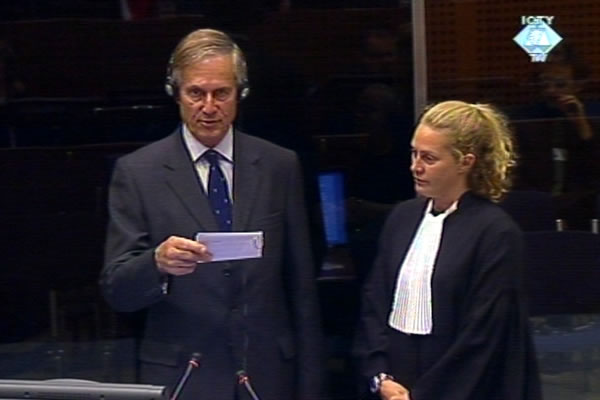Home
HOW KARADZIC’S ‘GOOD DEED’ TURNED INTO EVIDENCE FOR PROSECUTION
In his evidence at the trial of Radovan Karadzic, British general Sir Michael Rose said that the accused was a ‘man of his word’. Karadzic kept his promise that Serb forces wouldn’t fire on Sarajevo during a football match between the FC Sarajevo and the UN peace forces. According to the prosecution, this proves that Karadzic had ‘effective control’ over the troops that terrorized Sarajevo
 Michael Rose, witness at the Radovan Karadzic trial
Michael Rose, witness at the Radovan Karadzic trial On 20 March 1994, a friendly football match was played in the besieged Sarajevo at the Kosevo stadium between the Sarajevo football club and the ‘blue helmets’ serving in the peace mission in BH under the command of British general Michael Rose. Not a single Sarajevan was killed or injured in the 90 minutes of the game.
In his evidence at the trial of Radovan Karadzic, General Rose remembered that the then president of Republika Srpska personally guaranteed that the match would go on ‘without any interruptions’, and that is how it was. As Rose recollected, about 10,000 to 20,000 Sarajevans watched the game and not a single sniper or artillery projectile was fired from the Bosnian Serb positions. Karadzic ‘was a man of his word’, Rose said. Rose this confirmed to prosecutor Carolyn Edgerton that in military sense it meant that the then VRS supreme commander showed he had ‘effective control’ over his troops.
In 1994, General Rose commanded the UN peace-keeping forces in BH. In his written statement, tendered into evidence today, Rose said that upon his arrival in Sarajevo he saw that the city was ‘reduced to an almost medieval level, with no water, electricity or gas’. The Bosnian Serb leadership, the witness said, used ceasefires as a means to cement the lines they had reached. The VRS held over 70 percent of the BH territory, and it blocked humanitarian relief supplies to pressure the Bosnian government into accepting peace agreements that would be to the advantage of the Serbs.
After a Croat-Muslim federation was set up in the spring of 1994, the conflict reached its culmination, Rose said. The balance of power changed to the detriment of the Serb leadership and it was now in a hurry to reach an agreement. The Serbs were willing to trade territory, and they stepped up the pressure on the government in Sarajevo. In Rose’s view, the shelling and sniping in Sarajevo were a way to pressure the Bosnian authorities into accepting peace under the terms dictated by the Bosnian Serbs. Also, Rose explained, the terror campaign was a response in retaliation for the losses the VRS suffered on other battlefields outside Sarajevo. ‘This was at the base of the overall strategic situation in BH’, Rose concluded.
From the way the Serb forces in the field responded to the ultimatums of the international community, General Rose concluded that there was a close link between the political and military leadership on the one side and the commanders in the field on the other, ‘down to the last tank’. ‘It is obvious that the subordinates obeyed the orders issued from the top’, the former UNPROFOR commander said.
At the beginning of his cross-examination, Radovan Karadzic claimed that he was ‘surprised’ when General Rose told him yesterday during a proofing interview in the detention unit that some people considered Rose to be ‘pro-Serb’. As Karadzic noted, their relationship during the war ‘often grew colder, and was disrupted at times’ but they ‘always had respect for each other’. Karadzic said he never considered Rose to be ‘pro-Serb’. Rose replied he was ‘glad to hear it’. Karadzic then asked Rose, ‘can you be objective given that you are under the pressure of being pro-Serb’. Judge Kwon interrupted Karadzic, noting he saw ‘no sense in that’.
Karadzic, who has been granted a total of ten hours to examine General Rose, will continue his cross-examination tomorrow afternoon.
Linked Reports
- Case : Karadzic
- 2010-10-01 INTERCEPTS REMAIN IN EVIDENCE AGAINST KARADZIC
- 2010-09-30 KARADZIC: GENERAL CHAOS AND HIS AIDE FEAR
- 2010-09-29 KARADZIC: DARKNESS FELL AT 4 PM IN SARAJEVO
- 2010-10-06 KARADZIC: NO RECONCILIATION IF WE SHELLED THE MARKALE TOWN MARKET
- 2010-10-07 KARADZIC – NATO WAS “TRIGGER HAPPY”
- 2010-10-08 KARADZIC HAD ABSOLUTE CONTROL
